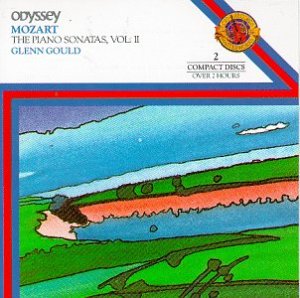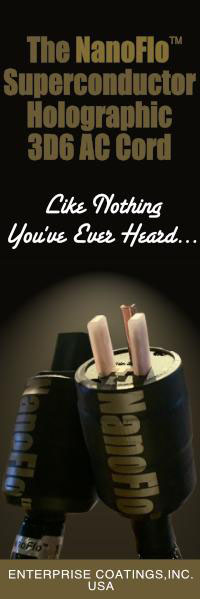Glenn Gould, Mozart: The Piano Sonatas
|
Glenn Gould, Mozart: The Piano Sonatas [MB2K 45612 and MB2K 45613] |
| Russell Lichter |
|
August 2004 |

I suddenly realized that for many months running I’ve been all tied up with newly issued CDs. I’ve written about some of them. It has been an interesting and enriching experience, but one involving lots of intense hours of repeated listening, and it has kept me away from my pre-existing library. So tonight I did not grab something new from Pro Piano or JVC or Telarc, but something old from CBS Odyssey: Glenn Gould, Mozart: The Piano Sonatas[MB2K 45612 and MB2K 45613]. Not DSD but ADD. Incidentally, these performances have also been reissued on the Sony label for more money ($47.98 for a set of four discs vs. $29.98 for two sets of two discs each). I haven’t heard the Sonys, so I can’t say if the sound quality is different. I’ve got no complaints about the Odyssey sound, but who knows? One thing JVC has taught us is that wonderful things can be done with old analog master tapes. Presumably the Sony set has nice liner notes; the Odyssey has none, so you’ll have to look elsewhere to read Gould’s comments on Mozart’s music, which, to anyone who has marveled at these performances, sounds very odd indeed. In a word, Gould didn’t care for Mozart.
It has been said, probably by me, that if Vladimir Horowitz’s playing is largely about Vladimir Horwitz, Glenn Gould’s playing is almost totally about Glenn Gould. There are people in this world who consider Horowitz a great musician, and Mr. Gould an upstart and poseur. And there are people in this world with quite different opinions, of both Gould and Horowitz. I belong, more or less, to the latter group.
Both of these pianists, now deceased, are technical wizards. I have seen Glenn Gould play on my television screen. I have seen Vladimir Horowitz play at the Dorothy Chandler Pavillion in Los Angeles (from a $45 balcony seat; it was an amazing experience). I have listened to a fair number of Horowitz’s recordings. I have listened to a lot of Gould’s recordings. And I have definite impressions of each one (whether those impressions are well founded and fair is another matter). Horowitz is tremendously emotional, Gould is essentially emotionless. Most music, especially pre-20th Century music, has emotional content and is sometimes downright emotional, so why would I have a higher regard for Gould, who shows no emotion, than for Horwitz, who shows perhaps too much? What makes Gould’s playing so overwhelmingly convincing is a perfectionism and an intense intellect brought to bear on the score. What makes Horowitz’s playing oftentimes not convincing is a perfectionism and intellect brought to bear on the audience. Both of these great pianists raise idiosyncratic playing to high art; I just happen to find Glenn Gould’s egocentricity far more interesting and fruitful than Horowitz’s.
(Gould, I should add, often seems at a loss when faced with Romantic music, music that calls for the full engagement of the heart as well as the mind. The Beethoven sonatas I’ve heard him play leave me, at best, scratching my head and at worst outraged. His Appassionata is a prime example. One, at least this one, does not buy Gould for Beethoven. J.S. Bach, however, is another story. Gould liked Bach, and about five million people really like the way he plays Bach. How about Mozart?)
One amateur reviewer on Amazon gave away his Walter Klien recordings of the Mozart Sonatas after he bought and heard the Gould’s. It’s an expression of his admiration for Gould. I had a slightly more moderate reaction: I just stopped listening to Klien, but I held onto the CDs. A few years later I went back and played them. Maybe I’d just mellowed, but I found them superb, albeit traditional, performances. Perhaps not inspired, but impeccably played.
Impeccably played? I’m not sure one can be all the confident of impeccability when talking about Mozart. After all, Richter was not the first pianist to express bafflement about exactly how Mozart’s music ought to be played. I hope he won’t be the last.
It is only accurate to note that Glenn Gould does not play Mozart the way Mozart intended. Even the most broad-minded of auditioners could not mistake Gould’sAllegro for Mozart’s Andante. As for the amazing emotional depths that Clara Haskil reveals, not a scintilla is to be found in Gould. It is precisely Gould’s wrong-headedness that makes his Mozart so interesting; that, and a keyboard technique that was the envy of six continents. Gould’s avowed dislike of Mozart’s music is impossible to fathom in view of the obvious intelligence and hard work that went into these performances. No doubt, no hesitation, no muddle here. Gould knows exactly what he wants, and he’s the baby that can pull it off. God, it must have felt good to be Glenn Gould playing Bach, and even, horrors, Mozart.
Wolfgang Amade Mozart was barely out of nappies when he wrote the earliest piano sonatas. In the hands of most pianists, they are capable of inducing terminal boredom. Gould, with an ego the size of Lake Simcoe, throws Mozart’s tempi out the window and gives us hair-raising renditions. Lesser musicians would not even imagineMozart could be played this way. That’s the part I especially love. That and seeing the outrage on the faces of hide-bound music lovers who cannot see their way to appreciating both Glenn Gould and Walter Klien. To paraphrase Nietzsche, we learn more from the idiosyncrasies of great musicians than from the technical perfection of lesser musicians.
We welcome any readers comments or suggestions for other audiophile CD favorites for upcoming Stereo Times reviews. Please contact Russelllichter@Stereotimes.com
![]()
Don’t forget to bookmark us! (CTRL-SHFT-D)
Stereo Times Masthead
Publisher/Founder
Clement Perry
Editor
Dave Thomas
Senior Editors
Frank Alles, Mike Girardi, Key Kim, Russell Lichter, Terry London, Moreno Mitchell, Paul Szabady, Bill Wells, Mike Wright, Stephen Yan, and Rob Dockery
Current Contributors
David Abramson, Tim Barrall, Dave Allison, Ron Cook, Lewis Dardick, Dan Secula, Don Shaulis, Greg Simmons, Eric Teh, Greg Voth, Richard Willie, Ed Van Winkle, and Rob Dockery
Music Reviewers:
Carlos Sanchez, John Jonczyk, John Sprung and Russell Lichter
Site Management Clement Perry
Ad Designer: Martin Perry





Be the first to comment on: Glenn Gould, Mozart: The Piano Sonatas